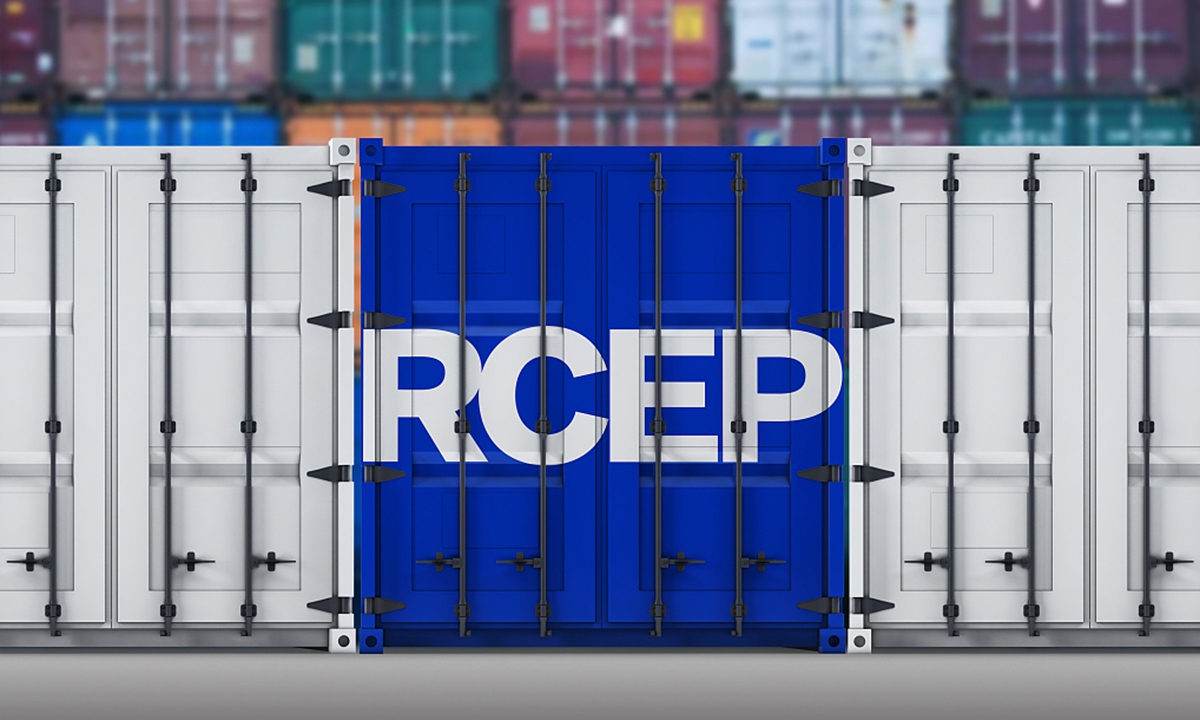Philippines’ approval of RCEP paves way for world’s largest trade deal, set to drive Asia-Pacific economic cooperation
Trade deal to drive regional economic cooperation, boost global recovery

RCEP Photo:VCG
The Philippines has officially approved the Regional Comprehensive Economic Partnership (RCEP) trade agreement, paving the way for ratifying the world's largest free trade area. Experts said that this move will bring greater benefits to members with more industry connections within the region.
The Philippine Senate on Tuesday ratified the RCEP, as 20 senators voted for the agreement, the Xinhua News Agency reported.
National Economic and Development Authority Secretary Arsenio Balisacan said the RCEP is a "vehicle that will drive the Philippine economy's sustained growth through regional and global trade as well as greater investment in strategic sectors," Xinhua reported.
"Being part of the RCEP will further enhance our market access, placing us on par with other RCEP-participating countries and the world's largest economies, such as China, Japan and South Korea, among others," he said.
The move shows that the fruitful results involving regional economic cooperation under the RCEP over the past year have been recognized by most Philippine senators, Xu Liping, director of the Center for Southeast Asian Studies at the Chinese Academy of Social Sciences in Beijing, told the Global Times.
Since the RCEP went into effect on January 1, 2022, economic and trade cooperation among member countries maintained robust growth, contributing to the economic recovery of the Asia-Pacific region, offsetting strong headwinds such as rising protectionism led by the US and sluggish global demand, experts said.
Trade between China and other RCEP members reached 12.95 trillion yuan ($1.88 trillion) in 2022, up 7.5 percent year-on-year, accounting for 30.8 percent of the country's total foreign trade, according to data from the Ministry of Commerce.
Beijing-based Duofu International Holdings, one of the top 500 private enterprises in China that is involved in mineral resources development, tourism and health, reached a strategic partnership deal with Indonesian firm PT. BDER Ventures on February 7, according to the company's press release.
Under the agreement, the two will work together to boost building-integrated photovoltaic systems in a couple of Indonesian cities including Jakarta and Bintan Island.
In addition, they will develop smart cities in Indonesia, conduct cultural tourism projects and provide helicopter and electric vertical take-off and landing aircraft services for Indonesia's tourism sector.
Hu Xingrong, chairman of Duofu Group, said the company attaches great importance to the Indonesian market, and will constantly help the country's new-energy transformation and the building of a new capital in Nusantara to help it reach carbon neutrality goal. The company aims to provide new momentum for the high-quality development of the Regional Comprehensive Economic Corridors and serve as a new bridge for China-Indonesia people-to-people bonds.
The year "2022 was a good start. The pact has great development potential," Xu said, noting that industry connections within the region are needed to further develop the benefits created by the RCEP.
RCEP members should earnestly implement the pact and strengthen cooperation in the areas of politics, economy and people-to-people exchanges to build a sound business environment in the region, Xu Ningning, executive president of the China-ASEAN Business Council, told the Global Times.
He said that they should build a firewall against economic and security risks through political cooperation, explore new growth possibilities and expand trade and investment through economic cooperation, and build a sound social basis through people-to-people and cultural exchanges.
In 2023, RCEP member countries are expected to see rebounds in tourism, real estate and other sectors along with the improvement of the COVID-19 situation and China's reopening.
While bringing development opportunities in a variety of sectors to members, the RCEP trade deal will further inject impetus into the global economic recovery, according to experts.
For example, the effect of stronger tourism activities due to the resumption of China's outbound group tourism could boost Malaysia's GDP by at least 1 percentage point, UOB Global Economics & Market Research said recently.

